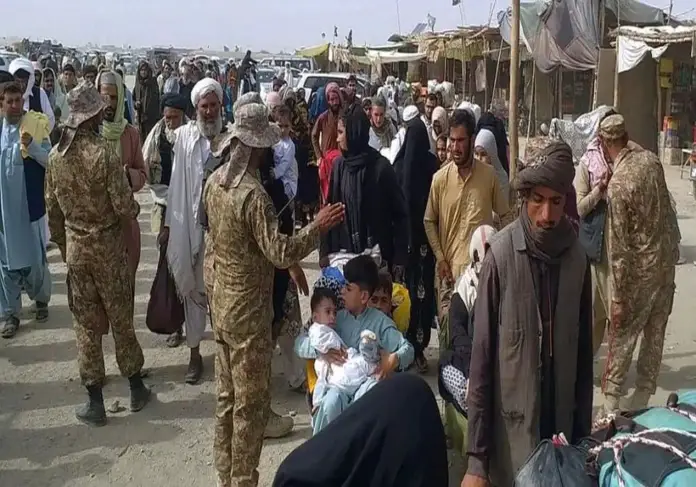The visiting United States Deputy Secretary of State Wendy Sherman held in-depth talks with the Pakistani leadership. Her visit at this critical stage was aimed to persuade Pakistan to come closer to the US. There is a willingness on both sides to continue cooperating with each other in all bilateral matters; Afghanistan, nevertheless, remained the key point of the discussion during the meeting. Indeed, the US wants Pakistan to play a key role in the Afghan peace process while protecting the US interests.
Pakistan is ready to facilitate the Taliban-led Afghan government for a broad-based setup including all minorities and women; however, there is reluctance from Taliban for any external interference. Meanwhile, there have been negotiations in Doha, Qatar, between the US special representative and the Taliban administration.
Undeniably, there is a contradiction in the US foreign policy towards the two South Asian countries: India and Pakistan. Whereas the US desires to use Pakistan for protecting its interests in Afghanistan and all around South and Central Asian regions, it is developing a long-term strategic relationship with India. This is clear from the statement of US State Department Spokesperson Ned Price: “Deputy Secretary Sherman emphasised the importance of a coordinated approach to Afghanistan and other issues vital to regional stability.” Sherman hinted in Mumbai prior to visiting Islamabad that the United States is not viewing a long-term and “broad-based relationship” with Pakistan. It is only focusing on “specific and narrow purpose” – Afghanistan.
All the US wants is for Pakistan to stabilise Afghanistan on its terms and conditions while keeping China and Russia away from Afghanistan. Such a dictate may not be acceptable to Pakistan since the US is responsible for creating a mess in Afghanistan and its fallout on Pakistan in the last two decades. Now after losing its position, the US wishes to remain relevant in Afghanistan through Pakistan and create more instability in the region.
In a way, the bilateralism between Pakistan and the US is linked to Afghanistan; “this particular trip was to really consult deeply on how we see the changing circumstances, given the change that has taken place in Afghanistan.”
In the meeting between the US delegation and the Taliban leadership, the US was told not to destabilise the Taliban government: “We clearly told them that trying to destabilise the government in Afghanistan is good for no one.” There was no worthwhile promise from the US team except the vaccination offer against COVID-19. This is a US strategy to reengage the Afghan masses.
There are reports that the US also offered the Taliban support against the Daesh (IS-K). Both these offers have many covert objectives since Daesh is the brainchild of CIA, and its transportation from the Middle East to Afghanistan was done by the US to counter Taliban and create militancy in all the countries surrounding Afghanistan. There have been repeated acts of terrorism in Afghanistan killing over 100 people in the last one month. All these terrorist acts have been claimed by IS-K.
This also highlights the loopholes in the Taliban control of Afghanistan. If Daesh can still operate and carry out acts of terrorism in mosques and public gatherings in Afghanistan it is a question mark on the Taliban authority. The reengagement of the US with Taliban is a direct outcome of the three key reasons. One, Taliban has been slow in the formulation of their government after the US and NATO pull-out. Two, the regional states like Russia and China have shown reluctance towards engaging with the Taliban government. Three, Taliban did not fulfil the promise of a broad-based and an all-inclusive government. There are also reports that there are fissures among the various factions of Taliban, which resulted into chaos towards a united policy at home and abroad.
The emerging situation in Afghanistan, the response of the regional states, and the US efforts for reengagement with Taliban may have negative security effects for the regions of South and Central Asia. IS-K is carrying out terrorist attacks at will, thus creating a security situation for the Afghan people as well as the Taliban government. The non-cooperation from the regional states will push the country towards an economic disaster and political chaos.
The TTP attacks on Pakistani security forces are being viewed as if the TTP have the blessings of the Afghan Taliban government. There have been repeated attacks on Pakistani military posts in the former FATA areas, killing dozens so far. The way forward is that Taliban should ensure security within Afghanistan and not allow the use of the Afghan soil by TTP, Daesh or any other terrorist group.
Taliban must cooperate with the regional states for their assistance in all respects: security, economy, and diplomacy. To achieve this level of cooperation, Taliban must include all minorities and women, without any discrimination, in their government. The regional states must extend a helping hand to strengthen the Taliban government in all respects. In the absence of these arrangements there is a likelihood that the US and India may access Taliban through indirect strategies, leaving no space for the regional states for the stabilisation of Afghanistan.






